Rafael Capurro
Work in Progress
Rafael Capurro |
CONTENTS
I. RESOURCES II. EXCERPTS & INTERPRETATIONS III. VARIA 1 / VARIA 2 IV. DRAFTS V. IMPACT VI. BIBLIOGRAPHY |
I. RESOURCES
 Information Cultures in the Digital Age. A Festschrift in Honor of Rafael Capurro. Editors: Matthew Kelly and Jared Bielby. Wiesbaden: Springer 2016 Thanks and Responses by Rafael Capurro Rafael Capurro - John
Holgate (eds.). Messages and Messengers. Angeletics as an Approach to
the Phenomenology of Communication. München 2011. 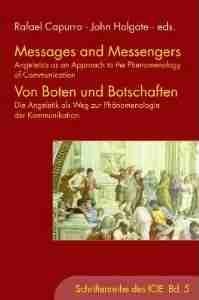 Contents Foreword Introduction Angeletics - A Message Theory Theorie der Botschaft A Dialogue on Intercultural Angeletics Beyond Humanisms On the Relevance of Angeletics and Hermeneutics for Information Technology See: José María Díaz Nafría: BITagora 2012
Towards a Phenomenology of Communication Source: Rafael
Capurro & John Holgate (eds.): Messages and Messengers Angeletics
as an Approach to the Phenomenology of Communication.
München: Fink 2011:
Introduction, pp. 28-30. Finally, since this publication bears the subtitle ‘an
approach to the phenomenology of communication’ it is worth considering
how angeletics is situated within the history of communication
philosophy – and particularly those theories and approaches which have
arisen since the 1950’s. Who are our interlocutors in this debate about
the nature of messaging? Who are our critics and allies?
Francisco Varela (embodied mind, logic of complementarity) Vilem Flusser (Communicology: messages and codes)
Giorgio Agamben (angelology) Romania Andrei Gabriel Pleşu (angelology)
In a sense all the above theories represent retreating
paradigms of communication which have been overtaken by the dramatic
changes in computing, social media and networking in the early 21st
century. Building on them however we aspire to a new paradigm of
communication, based on a deep ontic understanding both of messaging as
a phenomenon and of its relationship to informational phenomena in our
rapidly changing cultural environment. We
look forward to your participation in a lively debate about the themes
and issues raised in “Messengers and Messages.” Our goals in preparing
this publication were fourfold:
HENRY
G. LIDDELL, ROBERT
SCOTT: A GREEK-ENGLISH LEXICON
revised and augmented throughout by. Sir
Henry Stuart Jones. ANGELIA / ANGELOS / ANGELLO ἀγγελία , Ion. and Ep. ἀγγειο-ίη , ἡ, (ἄγγελος) A.message,
tidings, as well the substance as the conveyance
thereof, Il.18.17, Od.2.30, etc.; 2. announcement, proclamation, Pi.P.2.4: command, order, h.Cer.448, Pi.O.3.28, cf. Od.5.150, 7.263. 3. Ἀ. personified as daughter of Hermes, Pi. O.8.82. II. messenger, Ἶρις ἀ. v.l. Hes.Th.781. ἀγγελια-φόρος , Ion. ἀγγελιηφ- , ον, A.messenger, Hdt.1.120, Arist.Mu.398a31, Luc. Sacr.8, etc.: esp. Persian
chamberlain, Hdt.3.118.
A.of or for a messenger, “ῥῆσις” Phryn.PS p.45 B. b. conveying information, πάθος, of sensation, Gal.19.378. 2. angelic, “τάξις, νοῦς” Procl. in Ti.1.341, 3.126 D.; “γένος” Hierocl.in CA 2p.423M. Adv. “-κῶς”Procl.in Ti.3.192 D.: opp. δαιμονίως, Id.in Cra.p.71 P. II. ἀ. ὄρχησις Sicilian pantomimic dance at banquets, Ath. 14.629e, cf. Poll.4.103, and v. ἄγγελος 11; perh. from Ἄγγελος a name of Hecate, cf. Ath. l.c., Poll. l.c., Hsch.
A .messenger, envoy, Il.2.26, etc.; “δι᾽ ἀγγέλων ὁμιλέειν τινί” Hdt.5.92.ζ́, cf. SIG229.25 (Erythrae):— prov., Ἀράβιος ἄ., of a loquacious person, Men.32. 2. generally, one that announces or tells, e.g. of birds of augury, Il.24.292,296; Μουσῶν ἄγγελος, of a poet, Thgn.769; “ἄγγελε ἔαρος . . χελιδοῖ” Simon.74; ἄ. ἄφθογγος, of a beacon, Thgn.549; of the nightingale, ὄρνις . . Διὸς ἄ. S.El.149: c. gen. rei, “ἄ. κακῶν ἐμῶν” Id.Ant.277; “ἄγγελον γλῶσσανλόγων” E.Supp.203; “αἴσθησις ἡμῖν ἄ.” Plot.5.3.3; neut. pl., “ἄγγελα νίκης” Nonn.D.34.226. 3. angel, LXX Ge.28.12, al., Ev.Matt.1.24, al., Ph.2.604, etc. 4. in later philos., semi-divine being, “ἡλιακοὶ ἄ.” Jul.Or.4.141b, cf. Iamb.Myst.2.6, Procl. in R.2.243K.; “ἄ. καὶ ἀρχάγγελοι” Theol.Ar.43.10, cf. Dam.Pr.183, al.: also in mystical and magical writings, Herm. ap. Stob.1.49.45, PMag.Lond.46.121, etc. II. title of
Artemis at Syracuse, Hsch. A.“ἀγγέλλεσκον” Hsch.: Ep. and Ion. fut. “ἀγγελέω” Il.9.617, Hdt., Att. ἀγγελῶ, Dor. -ίω (ἀν-) Tab.Heracl.1.118: aor. 1 “ἤγγειλα” Hom., Att.: pf. “ἤγγελκα” Plb.35.4.2, (κατ-) Lys.25.30, (εἰσ-) Lycurg.1, (περι-) D.21.4:—Med. (v. infra): aor. ἠγγείλαμην (ἐπ-) Hdt.6.35, Pl.Grg.458d:—Pass., fut. ἀγγελθήσομαι (ἀπ-) D.19.324, later ἀγγελήσομαι (ἀν-) LXX Ps.21(22).30: aor. “ἠγγέλθην” Hdt., Att.: pf. “ἤγγελμαι” A.Ch.774, Th.8.97: plpf. ἄγγελτο v.l. in Hdt. 7.37:—aor. 2 Pass. ἠγγέλην is found IG1.27b (ἐπ-), E.IT932, and became usual in Hellenistic Gk., cf. LXX Jo.2.2 (ἀπ-), Plu.Ant.68, Hdn.3.7.1, etc.: aor. 2 Act. ἤγγελον is rare even in late writers, as (παρ-) App.BC1.121 without impf. as v. l., though in AP7.614 (Agath.) ἀγγελέτην is required by the metre:—bear a message, “ὦρτο δὲἾρις . . ἀγγελέουσα” Il.8.409; “τινί” Od.4.24, 15.458: c. inf., οἵ κε . . κείνοις ἀγγείλωσι . . οἶκόνδε νέεσθαι may bring them word to return home, 16.350, cf. EM6.52: c. acc. inf., “κήρυκες δ᾽ . . ἀγγελλόντων. . γέροντας λέξασθαι” Il.8.517. 2. c. acc. rei, announce, report, “ἐσθλά” Il.10.448; “φάος ἠοῦς” Od.13.94; “Ποσειδάωνι πάντατάδε” Il. 15.159:—in Prose, “μή τι νεώτερον ἀγγέλλεις” ; Pl.Prt.31cb; prov., οὐ πόλεμον ἀγγέλλεις'that's good news', Id.Phdr.242b; “ἀγγέλλωμεν ἐς πόλιν τάδε” ; E.Or.1539; “πρὸς τίν᾽ ἀγγεῖλαί μεχρὴ λόγους” ; Id.Supp. 399. 3. c. acc. pers., bring news of . . , “εἴ κέ μιν ἀγγείλαιμι” Od.14.120; later, “ἀ. περί τινος” S.El.1111:—dependent clauses are added with a Conj., “ἤγγειλ᾽ ὅττι ῥά οἱ πόσις ἔκτοθι μίμνε” Il.22.439; ἀ. ὡς . . E. IT704, D.18.169; ὁθούνεκα . . S.El.47:—also in part., ἦ καὶ θανόντ᾽ ἤγγειλαν; ib.1452; “Κῦρονἐπιστρατεύοντα . . ἤγγειλεν” X.An.2.3.19, cf. Cyr.6.2.15; with “ὡς, πατέρα τὸν σὸν ἀγγελῶν ὡςοὐκέτ᾽ ὄντα” S.OT955; “ἤγγειλας ὡς τεθνηκότα” Id.El.1341. II. Med., only pres., Τεύκρψ ἀγγέλλομαι εἶναι φίλος I announce myself to him as a friend, Id.Aj.1376. III. Pass., to be reported of, “ἐπὶ τὸ πλεῖον” Th.6.34: c. part., “ζῶν ἢ θανὼν ἀγγέλλεται” S.Tr.73, cf. E. Hec.591, Th.3.16, X.HG4.3.13: c. inf., “ἤγγελται ἡ μάχη ἰσχυρὰ γεγονέναι” Pl.Chrm.153b, cf. X. Cyr.5.3.30:—ἠγγέλθη τοῖς στρατηγοῖς, ὅτι φεύγοιεν that . . , Id.HG1.1.27:—“ἐπὶ τοῖς ἠγγελμένοις”Th.8.97. (ἀπ-αγγέλλω is more common in Oratt.) A.to be a false messenger (and false angel), Ph.1.273; cf. sq. ψευδαγγελ-ής , ές, A.= ψευδάγγελος, ψευδαγγελὴς εἶν᾽ Ar.Av.1340 codd. (ψευδαγγελήσειν Bentl.) ψευδαγγελ-ία , ἡ, A. false report, X.Eq.Mag.5.8, D.C.49.28. ψευδάγγελ-ος , ον, A. bringing a false report, lying messenger, Il. 15.159; Ὀδυσσεὺς ὁ ψ., title of play, Arist.Po.1455a14. HENRY G. LIDDELL; ROBERT SCOTT: A GREEK-ENGLISH LEXICON Oxford: Clarendon Press 1996 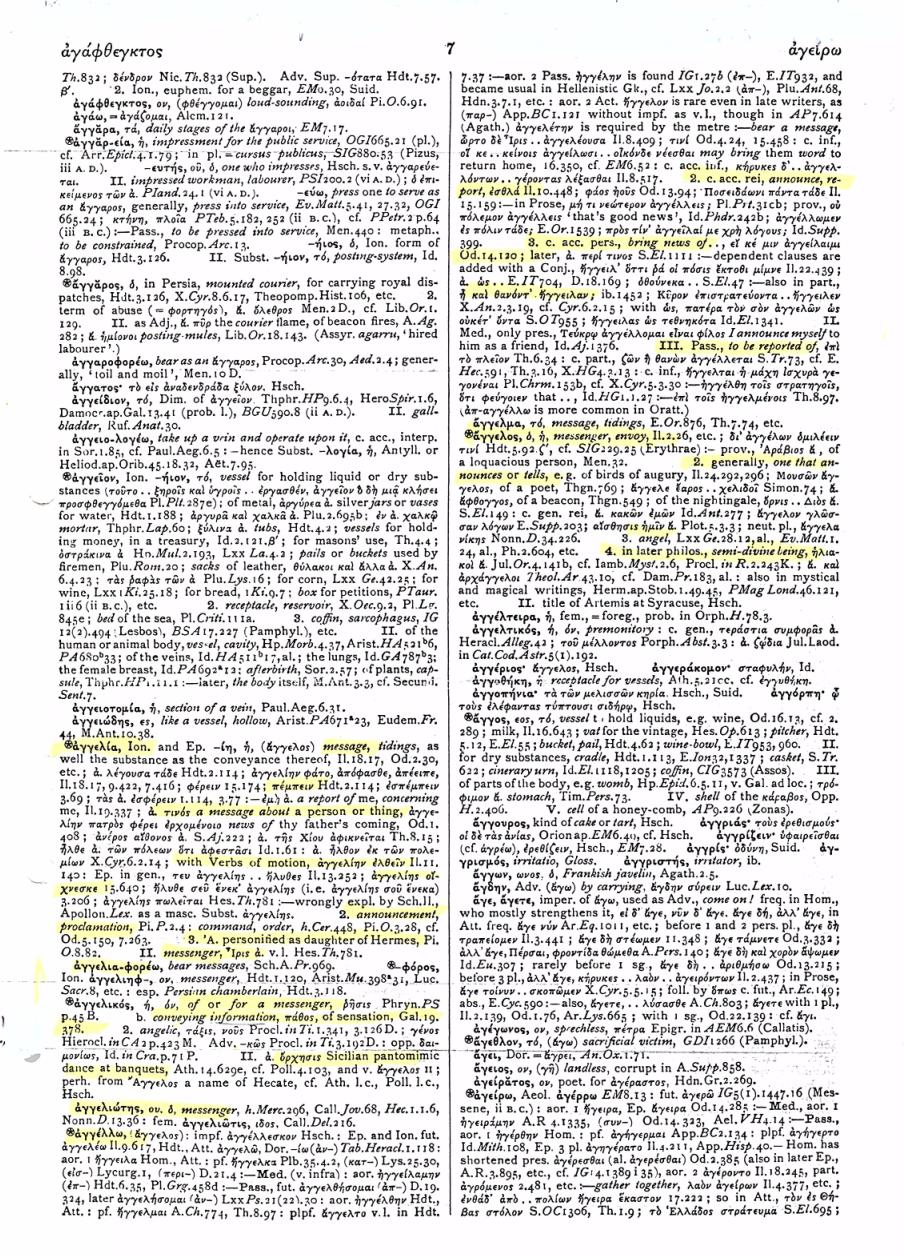 LEXIKON
DES FRÜHGRIECHISCHEN EPOS
Göttingen 1979 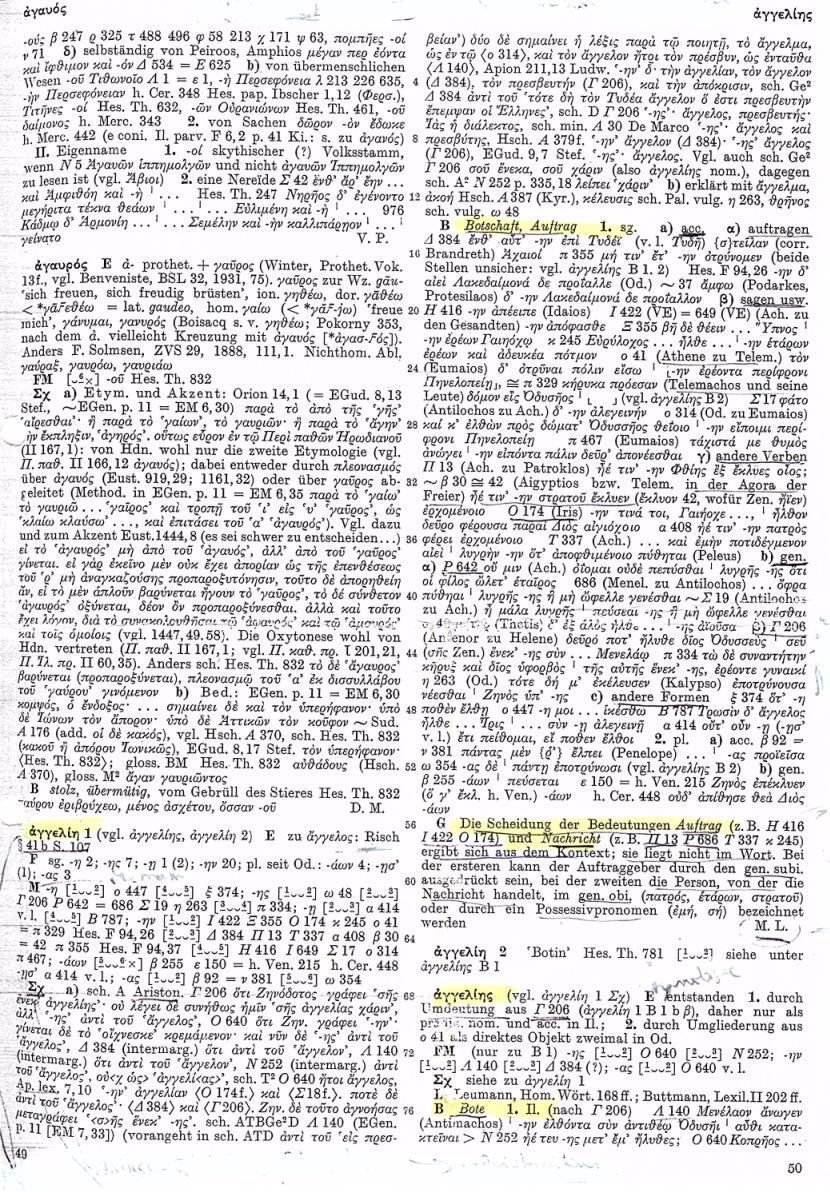 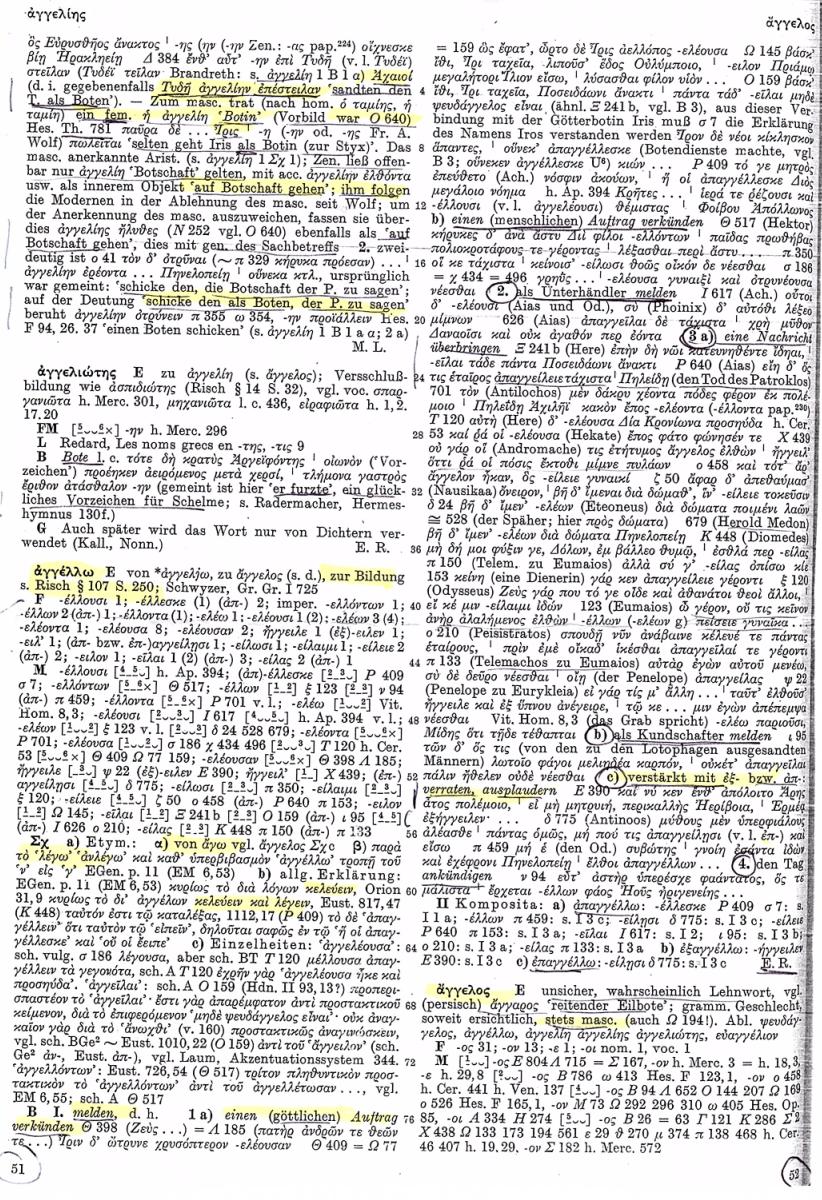 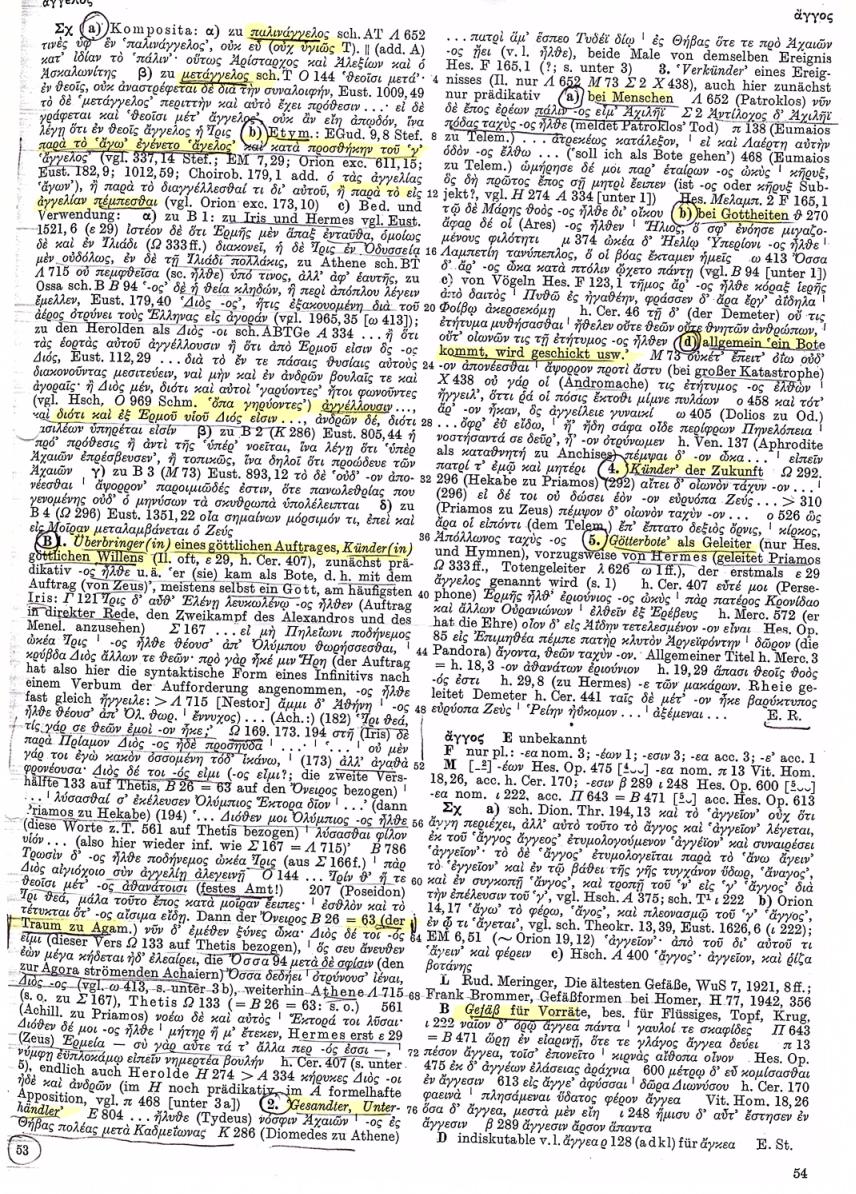 PAULY-
WISSOWA
Real-Encyclopädie der classischen Altertumswissenschaft Stuttgart: Metzler 1894, I, 2 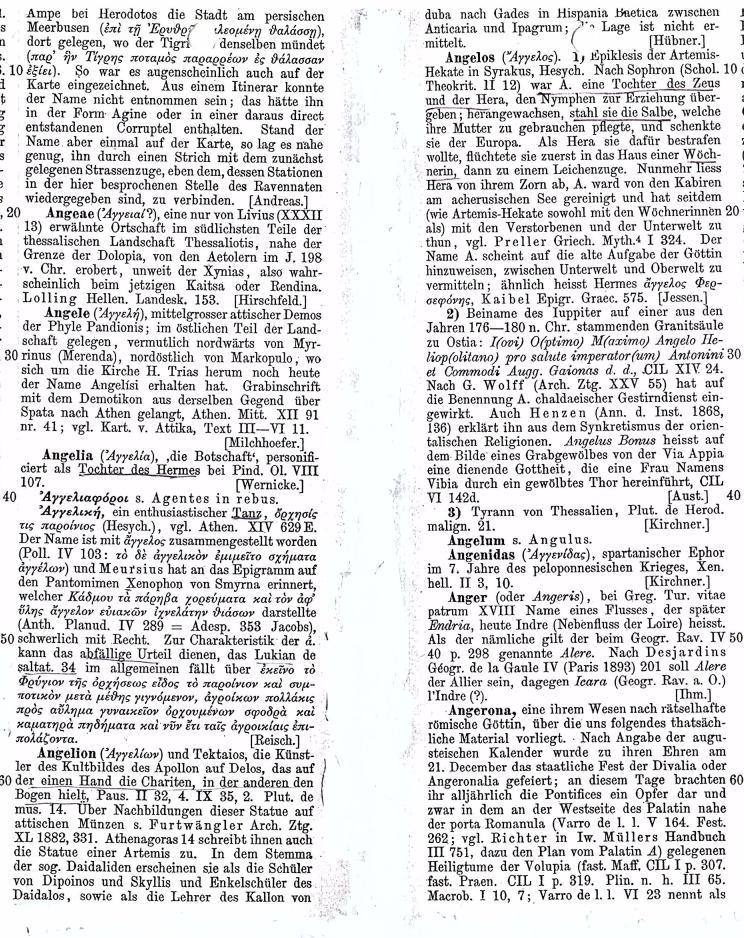 HENRICUS STEPHANUS: THESAURUS GRAECAE LINGUAE Paris 1854 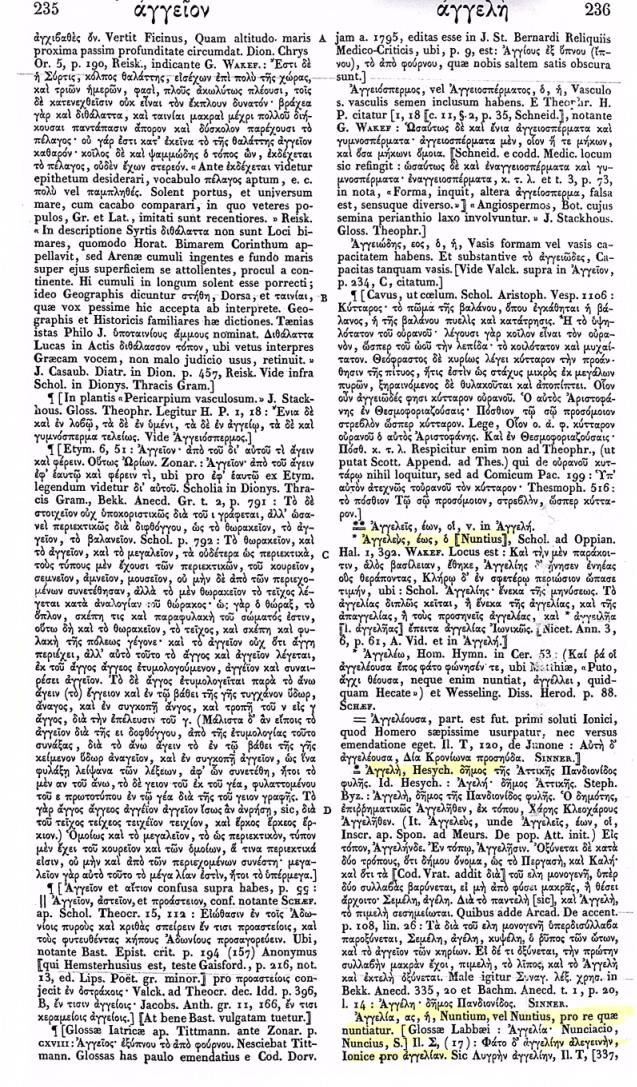 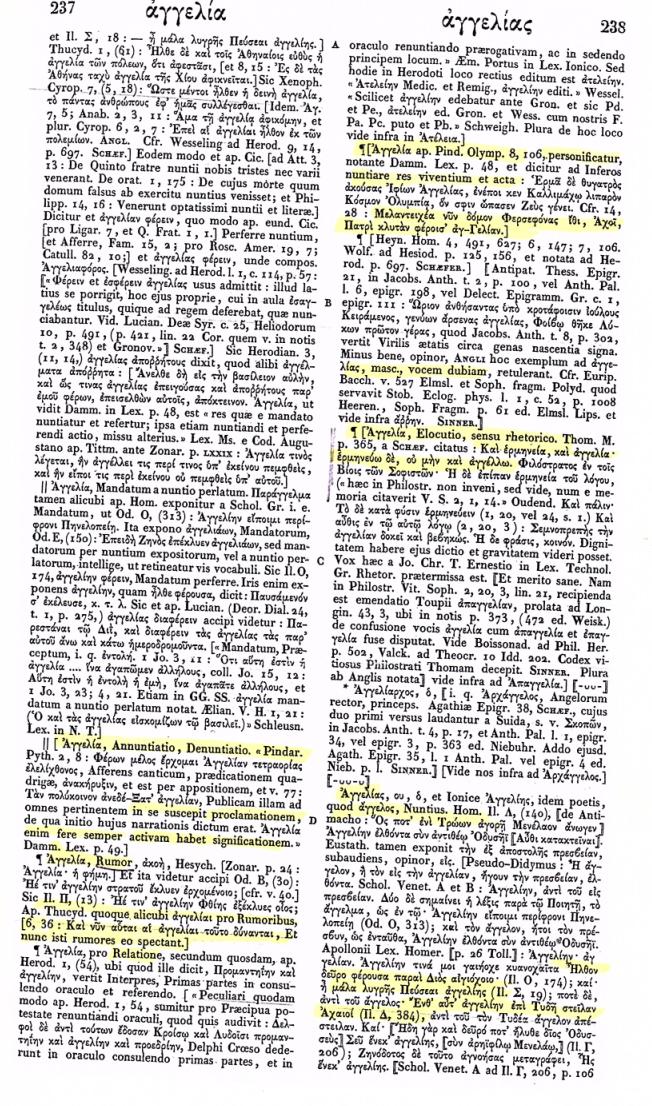 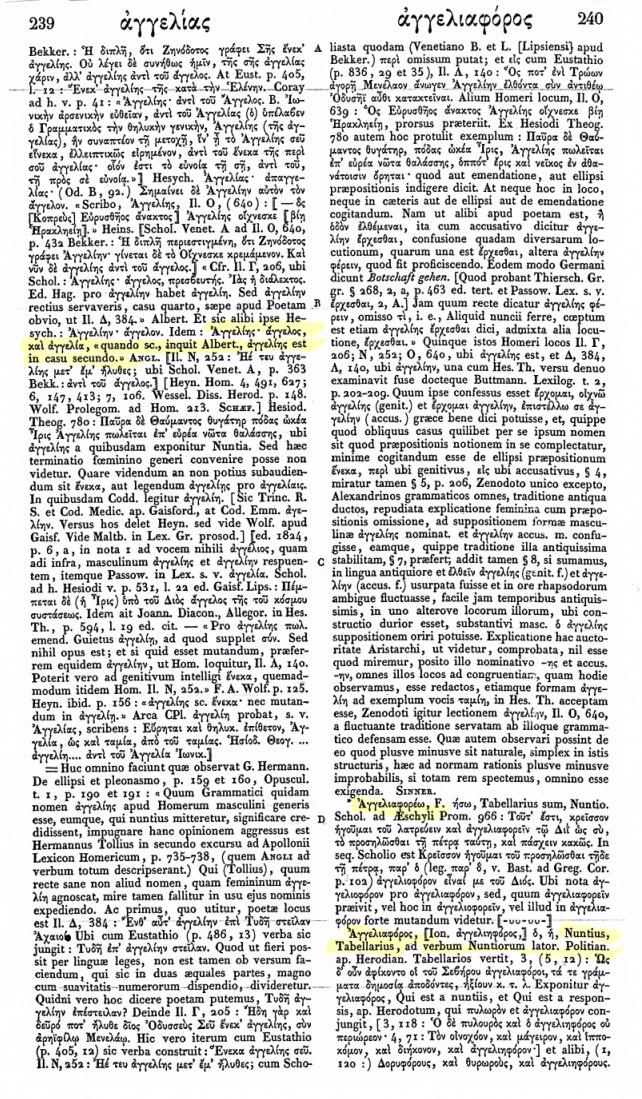 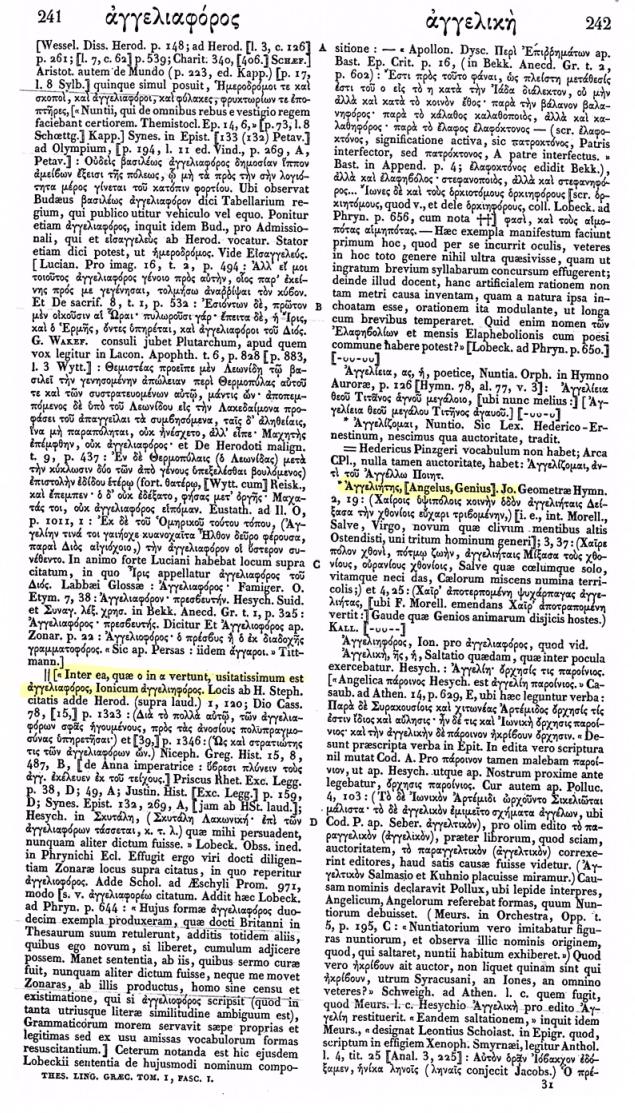 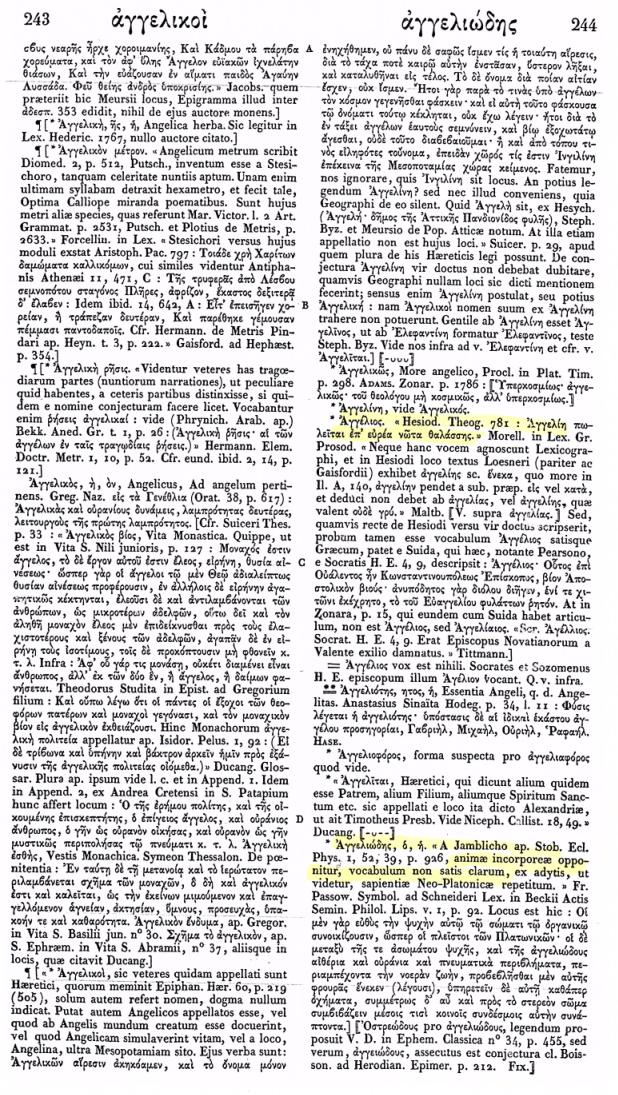 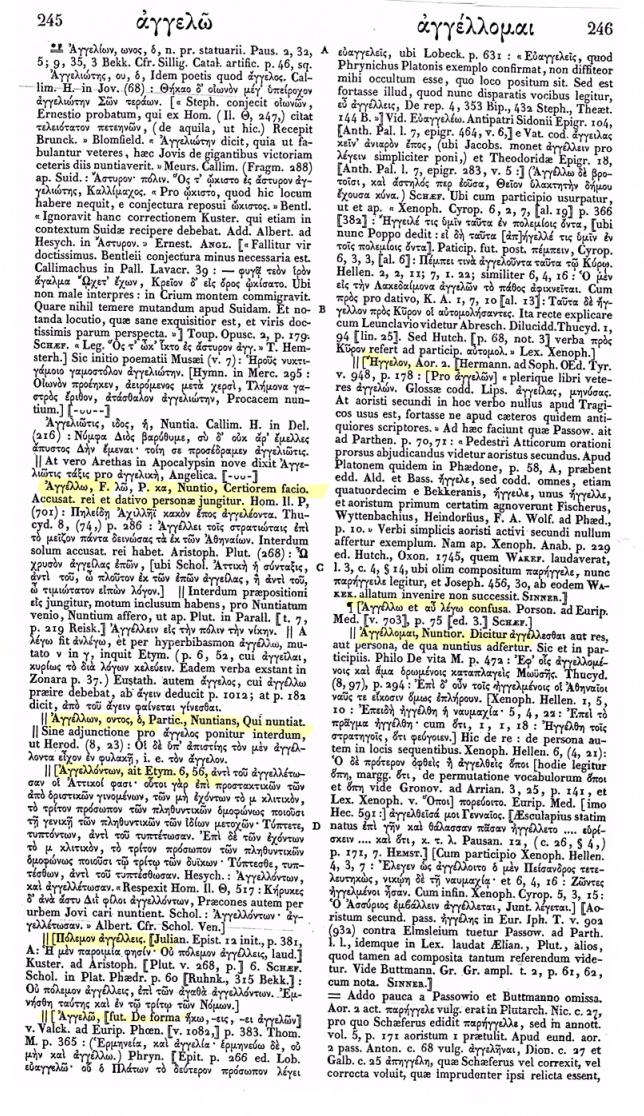 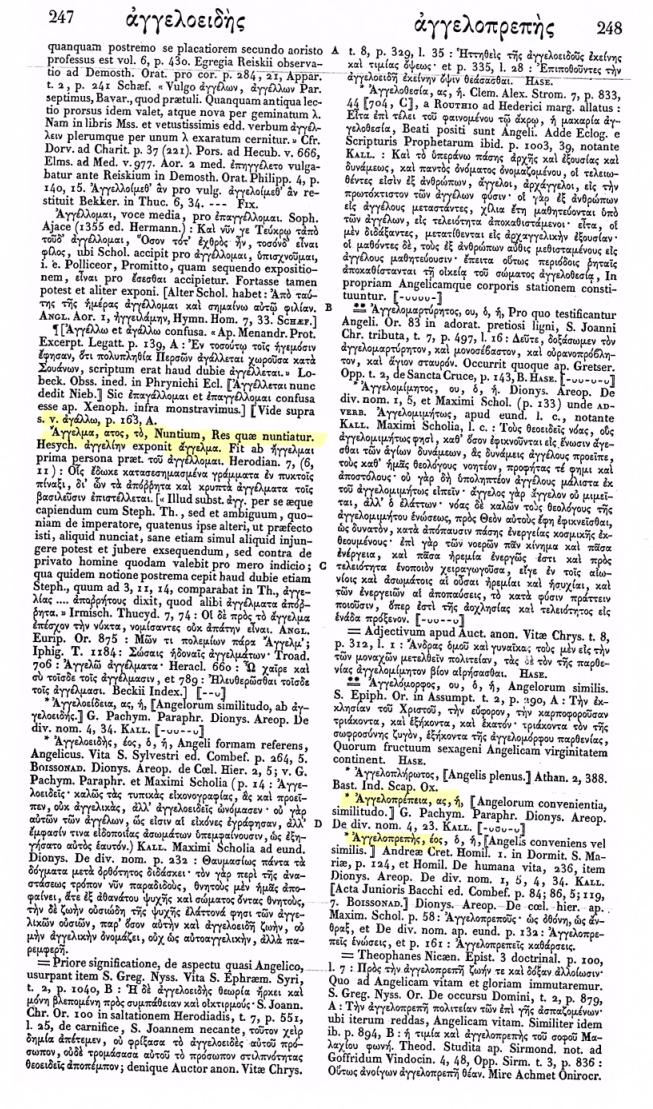 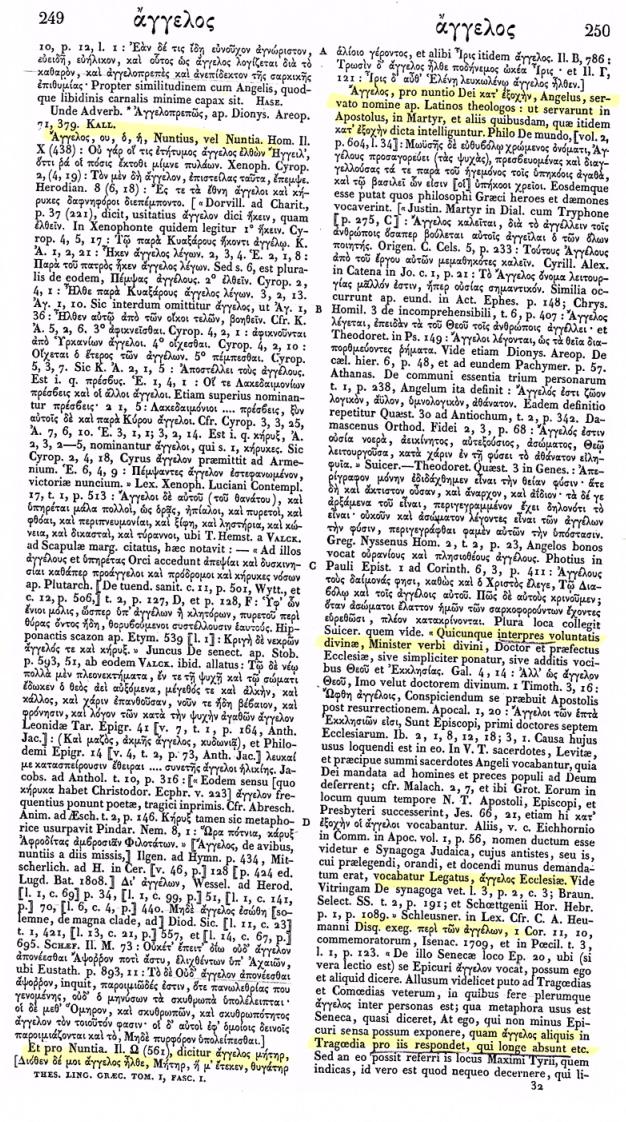 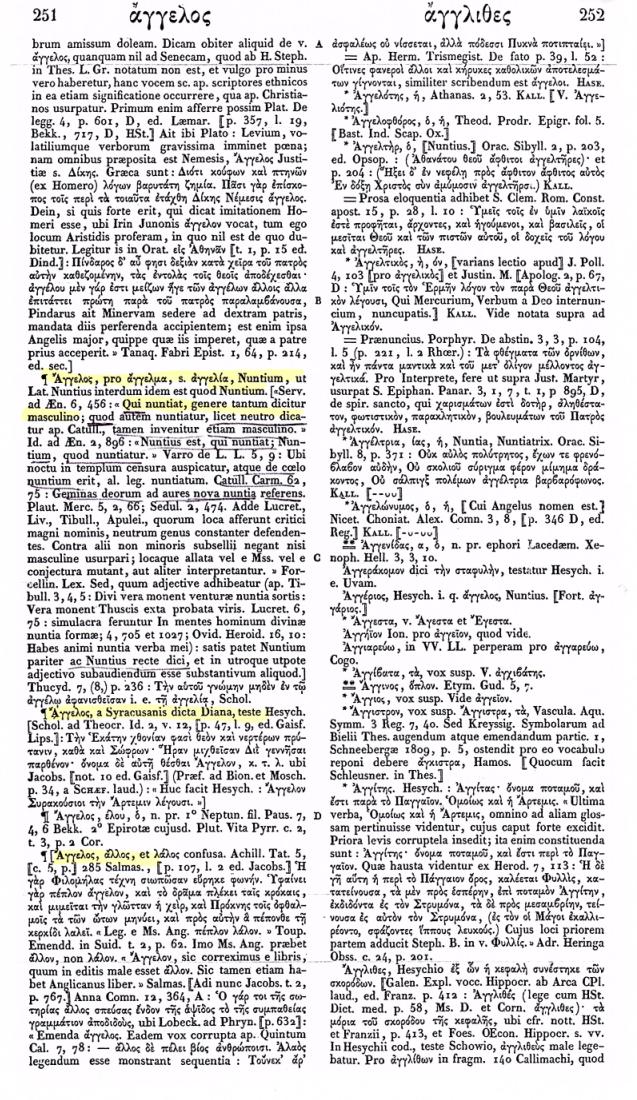 HERMES
Der Kleine Pauly. Lexikon der Antike München 1979, 1069-1076 Hermes (Hermes Hom. Od.
5,54; Hermas Comrinn.frg.4,23
D.; Hermeias Il.
15,214; Hermaon Hes.
frg. 23; Herman SEG
2,165; myk. E-ma-a2 (Dat.)
PY Nn 1357.1.Tn316.7.Un 219.8. Gallavorn-Sacconi Inscript. Pyliae, 1961, 105.121.126. L.R.Palmer, Eranos 53, 1955,12f. Mycenean Greek Texts, 1963,263f; zu etr. hermu auf der Pulena-Rolle (CIe 5430. M. Pallottino Testimonia Linguae Etruscae, 1954, 34): G. Devoto, SE 10, 1936, 277ff. M. Runes Serta Hoffilleriana, 1940, 156). Griech. Gott., Sohn des Zeus und der Maia (Hom. h. Herm. 579). Sein Name ist laut Nilsson Griech.Feste 388, Ggr I,503f, P. Kretschmer Gl 13, 1924, 104 und Wilam. GldH 1,159.285 von herma(x), hermaion "Steinhaufen" (Dion.Chrys. 78,19. Suda s.v. Sch.Nik.Ther.150) abzuleiten (vgl. aber Frisk 563f.), wobei die Frage indigener oder fremder (pelasg.?; vgl. Hdt. 2,51) herkunft (E. Benveniste, Rev.Phil. 6,1932,129f.) von der Etymol. her offen bleibt. (P. Chanrtaine, REv.Phil. 26, 1952, 229, AC 22, 1953, 69) Demnach wäre H. die Personifikation eines polyth. Hügelmals (Hermaios lógos Od. 16,471ff. M.W. de Visser die nicht menschengesatl. Götter der Griechen, 1903, 109ff) bzw. des urspr. aus ihm herausgehenden monolith. Pfeilers (-> Herme: Thuk. 6,27. R. Lullies Die Typen der griech. Herme 1931= als Typus des "Pfahlgötzen" (H. tegrágontos Paus. 4.33.4. Babr. 48.R. Meringer, IF 17, 1904/05, 165f. WuS 9, 1926, 109) oder des verlebendigten Phallos im Bereich des anikon. Stein- oder Klotzkultus (G.v.Kaschnitz-Weinberg Die mittelmeer. Grundlagen der ant. Kunst, 1944, 14ff.) Entstehung und primärer Sinn dieser Objekte sind umstritten (De Visser 103 ff. (5), 78 ff. K. Schefold, WJ 2, 1947, 46 gegen H. Goldman, AJA 46, 1942, 58ff.; Lullies, WJ 4, 1949/50, 126ff. gegen J.F. Crome, MDAI(A 60/68, 1935/36, 304 ff.); immerhin werden, wenn man in H. ein Numen des Grenz-, Grab- und Wegsteins sieht (Paus. 2,38,7. Polyain. 6,24, Babr.30, EpGr 1063, 4.Eust. in Od. 16,471. Or.Sib.aposp. 3,30 L. Curtius die ant. Herme, 1903, 9ff. E.Pfuhl, JDAI 20, 1905, 76ff), die wichtigsten Funktionen des Hüters der Türen und Tore (propúlaios Paus, 1,22,8 F.G. Maier Eranion, Festschr. H. Hommel, 1961 98ff. L.A. Holland Janus and the Bridg, 1961, 70. 201ff.275ff), der Wege und Wanderer (hodoipós Il. 24,375), des Grenzgängers und nächtlichen Geleiters (pompós Il. 24,153), auch in die Totenwelt (diáktropos Lukian.Char. 1.P. Thieme, SSAW 98,5,1952,52f.), darin beeits angesprochen ([1], 10ff. Nilsson 1,507f.), während die offenbar sekundäre Stimmsteinaetiologie (Sch. Od. 16,471. E. Simon, JOEAI 42, 1955, 11. [11], 88) im Zusammenhang mit der Auffassung vom Steinhaufen als Fluch- und Sühnmal (B. Schkmidt, JbPhP1893, 369ff. 1911,662f) wohl zurückweist auf die Verbindung zwischen dem Unterweltsbezug desH. ([11]) und seiner Rolle als Beseitiger weg- und lebensbedrohender Ungeheuer (Argeiphóntes Il.16,181.Kern Rel.der Griech. 1, 204. Zur Wortbd. den ergänzenden Apekt des in den phall. Hermen des elischen Kyllene und der arkad. Weidegebiete repräsentierten animal. Fruchtbarkeitsgotts, des mit Nymphen (Od. 14,435) und Bocksdämonen vertrauten Herdenwächters und -vermehrers (Il. 14,489ff) (A.J. v. Windekens) hält H. unter Hinweis auf seine Mobilität (erioúntos Il. 29,72) und sein ethnisch-sozial relevantes Wegprotektorat für den Prototyp und Schutzpatron des wehrhaften Nomadenhirten. Aus ihm hätte sich, indem die spez. Herdenwacht in eine allg. Schutzfunktion überging (Aischyl. Eum. 90 ff.), der menschenfreundliche Begleiter und Bewahrer reisender Könige und abenteuernder Heroen entwickelt (Il. 24. 222 ff 679 Od. 10, 277 ff. 11,626) In dieses Bild fügt sich sowohl der Charakterzug des primitiv-pastoralen Musikers (h. Herm. 24f.) als auch der des verschmitzten Rinderdiebs; andererseits käme das zum kyrukeion bzw. zur Zauberrute (rabdos) wie auch zum herscherlichen skeptron des ánax H. Als poimén laon (Il. 2,104f.) umgestaltete Attribut des wegweisenden, die Herde schützenden u. antreibenden Hirtenstocks bei dem Menschengeleiter (Il. 24,,343) wie bei dem Seelenführer (psuxopompós Od. 24,1fff.) noch zu annähernd urspr. Geltung. In der Tat gehören zu dem H., den nach Hdt. 5,7 die Stammeskönige des schafreichen Thrakien (Il. 11,222) als Ahnherrn und Schwurgott verehrten, die symbolhaltigen Motive des Stabes, des Phallos, des Widders und der Herde. Der vordorische Widdergott, im griech. Mythos als goldfelliges, die Luft durcheilendes Wunderwesen, dem Phrixos von H. selbst geschenkt mit seinem kostbaren Vlies der Inbegriff königl. Hirtengewalt, weist in die rel.-regale Sphäre der nomad. Skythen, in der, wie u.a. aus den Tätowierungen und Gewandapplikationen der Pazyryk-Kurgane hervorgeht das Widdersymbol dominiert, solares Zeichen der Einheit von herrscherlich-gentilz. Macht und reichen Viehbesitz. Da dieses Widdersymbol in der vom skyth. Nomadentum beeinflußten iran. Rel. als Sinnbild des Hwarnah, des sonnenhaften Königsglanzes , noch bei der Machtergreifung der Sasaniden Ardasir (226 n.Chr.) wirksam ist, andererseits der Königsgott H.-Helios-Mithras gemeinsam mit Herakles-Ares-Artagnes (Verethragna) als Protektor des Antiochos von Kommagene auf den Monumentalreliefs des Nemrud Dag (um 35 v.Chr.) erscheint, darf man in der den sog. "königlichen Skythen" (Paralátai Hdt. 4,6) bes. verbundenen, durch das von den basileis gehütete und kult. verehrte Königsgold repräsentierten Gottheit (Hdt. 4,7) den solaren Widdergott H.-Mithras erkennen. Die Widderopfer für H. in den Mysterien von Andania und die in der Kriophoros-Symbolik des Pluton-Persephone-H.-Reliefs von Lokroi Epizephyrioi akzentuierte Verbindung des H. mit Widder und Hahn lenken den Blick auf einen neben dem solaren und phallischen vorhandenen internal. Aspekt der thrako-skyth. H.-Komponente, der die Berührung des Psychopompos mit dem totengeleitenden thrak. Reiterheros bzw. dem ihm funktionsgleichen skyth. Herakles-Targitaos-Verethragna (Hdt. 4.5, 8.59) ermöglicht. Alles ist gemeinsam die Bewältigung dämon.-unterweltlicher Monstren (Heros und kerberos) für H. selbst konserviert in dem Titel Argeiphontes ("Schlangentöter"); "Hundstöter" für den regalen Kullénes pálmus überlieferten Epiklese Kandaúlas (= Kunágnes "Hundswürger") zuzuweisen. Gleichwohl wird in dem Hundwürger, Drachenbezwinger und Sichelhelden H. (Ov. met. 1, 717) der Bezug zum min.-ägäischen "Herrn der Tiere" (h.Herm. 569 ff.) sichtbar, der das Zahmvieh des Hirten sowohl schützen als auch nächtlich raubwürgend dezimieren kann. Darauf führt auch seine Ggenposition zu der prähellen .Ptontia therón Kirke, die Verfügung über die altmediterrane Zauberwurzel Moly (Od. 10, 305ff.), schließlich sein Sohnverhältnis zuz der Muttergöttin Maia der arkad. Kyllene, wo vorgriech. Höhlenkult nach Keta und Kleinasien hinüberweist. Zwar mußte die Gleichung mit dem anatol. Mondgott Arma inzwischen erheblilch modifiziert werden, dafür bleiben zu beachten die Berührungen mit Dionysos und die alte Vergesellschahftung des H.-Kadmilos. Die in der etr. Bezeichnung Turms ausgedrückte enge Bindung an Unterweltliches präsentiert sich durch das dem wegöffnenen und schatzspendenden goldenen Zweiges (h.Herm 529 ff) als mag. Pootenz eines seelenzwingenden (h. chtónios) aber auch lebenschützenden Numens (h. psychagogó) im Grenzbezirk zweier Welten. Die Zwielichtigkeit titan. Abstammung vom weisen und starken, aber auch verderblich sinnenden Weltriesen Atlas (Od. 1,52., ) bewahrt dem H. vereinzelt, vor allem im Kindheitsmythos (h. herm. 13ff) Eigenschaften einer Trickster-Gestalt: Gewandtheit, List, Erfindungsgabe, Schelmenwitz, Kraft, Dreistigkeit (108ff.) doch ohne die metaphys. bosheit etwa des german. Asenfeindes Loki. Die Andersartigkeit gegennüber den Olympiern spricht sich eher positiv aus in der mühelosen Behendigkeit des deus ales (100f.), im Einfallsreichtum zauber. Hilfeleistung (Arsund Aloaden: Il. 5, 390 ff.), in der liebenwürdigen Verbindlichkeit des Götterboten (ángelos Od. 5,29), des Vaters der Dolmetscher und Herolde (Plat. Krat. 4074). Wie wenige Götter, hat H., zu klass. Zeit in scheinbarer Zweitrangigkeit zum Herren der Bediensteten, Handwerker und Diebe gestempelt (Aristoph. Pax 201ff. Plut. 1100ff) eine Wiederbelebung seiner eigentümlichen Wesensseiten in der mysteriengetränkten Rel. der Späant. erfahren. Das gilt nicht nur für den Angelos (J. Barbel Christos Angelos, 1941, 15 ff. A. Ferrua: Civiltà Cattolica 98, 1947, 51ff.), den mit dem chton. Herakles gekoppelten Unterweltsgott sowie die an den Mágos und Logios geknüpfte Moly-Symbolik (H. Rahner, Eranos-Jb.12, 1945, 117f), sondern auch für den Schutzpatron der hellenist.-röm. Herrscher und bes. für den "guten Hirten" als Nachklang des Kriophoros. Alle diese Funktionen sind mehr oder weniger in Einklang zu sehen mit dem aus rel-philos. Synkretismus geborenen Phänomen des H. Trimesgistos, das im äg.-hellenist. Corpus Hermeticum durch den graeco-kopt. Geheimbegriff des -> Poimandres-Nous und durch die Erscheinungsform des allweisen Thoth-Logos (Diod. 1.16,1. Cic.nat. 3,56, 1,67ff) samt seinen äg. Nebenfiguren Kamephis, Knephis u. Arnebeschenis die Vielfalt der H.-Eigenschaften spekulativ-umgedeutet zur Geltung bringt. So wird H. zum Rel.-Stifter, Verkünder, Mittler und Erlöser in den esoterischen hermet. Zirkeln und den genost. Sekten der Naassener und der harran. Sabier. sowie in den sethian. Lit. der kopt. Bibliothek von Nag' hammadi-Chenoboskion, ferner zum kosmokrátor mégas und pánton mágon archegétes der hellenist. Zauberpapyri und Defixionstäfelchen; er erscheint sogar als der "große Herr" Armasa Metatron in den Inkantationen der aram. Beschwörungstexte von Nippur. Fama ist
in der römischen Mythologie die Gottheit des Ruhmes wie
auch des Gerüchts. Der Fama entspricht Pheme und Ossa In mythologischen Texten gibt es nur
wenige anschauliche Darstellungen der Figur. Mehrfach erscheint Pheme
bei Nonnos von Panopolis; Einzelnachweise Vgl.
Pheme (Φήμη). Personifikation
des Gerüchts: der üblen Nachrede. Hes. erg. 760ff.,
der
Siegesbotschaft Bakchyl. 2,1. 9,1. Soph. Oid. T. 158. El. 1066.
In
Athen hatte die göttliche Stimme einen Altar, Pau s. 1,17,1,
errichtet nach Komons Sieg am
Eurymedon 466, Aischin. 1,128 u. Sch. IG-XIV 1120 (aus Tusculum) Φήμη εὐαγγέλω. Anth. Pal. 10.89. Vgl. Hom. Il. 2,93 Ὄσσα, Διὸς ἄγγελος. Od. 24.413. → Fama, Aius Locutius. (H.v.G.) Wilam. GldH I,17f. Ders. Hesiods Erga 129. O.Kern Die Rel. der Griechen 1, 79f. HENRY
GEORGE LIDDELL & ROBERT SCOTT
A Greek-English Lexicon Oxford: Clarendon Press 1996
Source: Theoi Project : Aaron J. Atsma, Netherlands & New Zealand
OSSA (Ossa), the personification
of rumour or report, the Latin Fama.
As it is often impossible to trace a report to its source, it is said to come from Zeus, and hence Ossa is called the messenger of Zeus (Hom. Od. i. 282, ii. 216, xxiv. 412, Il. ii. 93). Sophocles (Oed. Tyr.158) calls her a daughter of Hope, and the poets, both Greek and Latin, have indulged in various imaginary descriptions of Ossa or Fama (Hes. Op. et Dies. 705, &c.; Virg. Aen. iv. 174, &c.; Ov. Met. xii. 39, &c.). At Athens she was honoured with an altar. (Paus. i. 17. § 1.) Source: Dictionary of Greek and Roman Biography and Mythology Ossa Personification of
Rumour Homer,
Iliad 2. 93 ff (trans. Lattimore) (Greek epic C8th B.C.) : "[The
Greeks] marched in order by companies to the assembly, and Ossa
(Rumour) walked blazing among them, Zeus' messenger, to hasten them
along."
Homer,
Odyssey 2. 216 ff (trans. Shewring) (Greek epic C8th B.C.) : "[Telemakhos
(Telemachus) departs in search of his father Odysseus :] ‘Perhaps some
human witness will speak, perhaps I shall hear some rumour (ossa) that comes from Zeus, a great source of tidings for mankind.’" Homer,
Odyssey 24. 412 ff : "Ossa
(Rumour) as herald was speeding hotfoot through the city, crying the
news of the suitors' [of Penelope] hideous death and doom."
Hesiod, Works and Days 760 ff (trans. Evelyn-White)
(Greek epic C8th or C7th B.C.) : "Do
as I tell you and keep away from the gossip of people. For Pheme
(Rumour) is an evil thing,
by nature, she's a light weight to lift up, oh very easy, but heavy to carry, and hard to put down again. Pheme (Rumour) never disappears entirely once many people have talked her big. In fact, she really is some sort of goddess." Bacchylides,
Fragment 2 (trans. Campbell, Vol. Greek Lyric IV) (Greek lyric C5th
B.C.) : "Speed
to holy Keos (Ceos), Pheme (Report), you giver of majesty, and carry
the message of gracious name, that Argeius won the victory [in the Games]." Bacchylides, Fragment 10 : "Pheme (Report), you visit the tribes of mortals and to
all . . . because with their eyes they have looked on golden blessed
Nike (Victory)."
Sophocles, Oedipus the King 151 ff (Greek tragedy C5th
B.C.) : "Chorus : O sweetly-speaking message of Zeus, in what
spirit have you come to
glorious O Delian healer [oracular Apollon] to whom wild cries rise, in holy fear of you, wondering what debt you will extract from me, perhaps unknown before, perhaps renewed with the revolving years. Tell me, immortal Phama (Pheme, Report), child of golden Elpis (Hope)." Pausanias, Description of "They [the Athenians] are conspicuous . . . for their
devotion to religion. They have an altar of Aidos (Aedos, Shame),
one to Pheme (Rumour) and one to Hormes (Effort)." Anonymous, Dionysus and Lycurgus Fragment (trans. Page,
Vol. Select Papyri III, No. 129) (Greek epic C3rd A.D.) : "[Lykourgos (Lycurgus) was driven mad by the god Dionysos
:] Baneful Rumour (phêmê) of his madness
should arrive at Thebes on wings and summon Ardys and Astakios (Astacius), his two sons, and Kytis (Cyis) who married him and was subdued to his embrace. They, when led by Rumour’s (phêmê) many tongues they came, found Lykourgos just now released from suffering, worn out by madness." Nonnus, Dionysiaca 5. 370 ff (trans. Rouse) (Greek epic
C5th A.D.) : "Already Pheme (Rumour) self born had flown from the
hills to Autonoe, proclaiming her son's [Aktaion's (Actaeon's)] fate
torn to pieces by his dogs."
Nonnus, Dionysiaca 18. 1 ff : "Meantime manytongued Pheme (Rumour) was on the wing; and
she flew along the whole line
of Assyrian cities, proclaiming the name of Dionysos with his gift of the vine, the glorious fruit of grapes ,and his bold warfare with the Indians." Nonnus, Dionysiaca 44. 123 ff : "[Dionysos returned to
Already Pheme (Rumour) was flying about the seven-gated city proclaiming the rites of Dionysos." Nonnus, Dionysiaca 47. 1 ff : "Pheme (Rumour) was flitting up and down the city,
announcing of herself that Dionysos of the grapes had come to visit
II. LATIN
AEGIDI FORCELLINI: TOTIUS
LATINITATIS LEXICON
Prati (Roma) 1868, t. IV Nuncio
- Notitia (pdf)
NUNCIO et Nuntio, as, avi, atum, are, Verbum transitiv., quod a novum et cio ducunt, cui etymo favet Varr. G. 1.L.7 §. 58. "Nuntius est ab novis rebus nominaturs, etc." b) Ad scriptionem quod attinet, Manut. et Dausqu. per c scribi volunt, ita praeferentibus Lapidibus aliquot: sed non desunt qui per t, et Virgilius Carpensis et antiquissimum horum Cenotaph. Pisanum C. Caesaris, quod orthographiam aureae aetatis demonstrat. Quare t retinent Norisius, et Cellar. c) Veteres nountios pro nuntios scripsisse testatur Mar. Victorin. t. 4. 28. Nontiatus pro nuntiatus est in Inser. in Bullet. Archeol. Napol. a. 1858, p. 19. - d) Particip. nuncians §. 1., nunciatus, V. suo loco, nunciaturus § 1.- c) Derivata, nunciatio, nunciator, nunicatrix, nuncius. - f) Composita, annuncio, bellinuncia, benenuncio, connuncio, denuncio, enuncio, internuncia, internuncio, internuncium, internuncius, obnuncio, pernuncio, pronuncio, renuncioo, renuncius. NUNCIO et Nuntio, proprie est aliquid novi significo, renuntio, per nuntium significo, nuntium fero, apporto, moneo; annunziare, apportare, riferire, dar nuova, far sapere. Caes. 5. B.G.10. Equites ad Caesarem venerunt, qui nuntiarent, prope omnes naves afflictas esse. Et. 4. ibid. 11. extr. Ad praefectos mittit, qui nuntiarent, ne hostes proelio tacesserent. Nept. Themist. 4. Misit ad regem, ut ei nuntiaret suis verbis, adversarios in fuga esse. Ter. Heaut. 4.1.5. Abi intro, atque illa si iam laverit, mihi nuntia. It. Phorm. 5.7.13. It ad vos venio nuntiatum, Paratum esse me. Cic. 1. Att. 13. Non dubito, quin celerius tibi hoc rumor, quam illius nostrum litterae nuntiarint. Ter. Hecyr. 4.4.20. Bene nuntias; mi dai una buona nuova (Cf. BENENUNTIO). Et Heaut. 1.2.10. voluptatem magnam nuntias. Plaut. Stich. 2.2.67. Nuntiare nuntium exoptabilem. Cic. 4. Acad. 25. Quid est quod perecipi possit, si ne sensus quidem vera nuntiant? dicono il vero. Tacit. 16. Ann. 11. Ergo nuntiat patri, abiicere spem, et uti necessitate. Cic. Pis. 19. Huius unius litteris nuntiantibus non crederet? Liv. 29.22. Tanquam victoriam nuntiaturi Romem essent. 2) Passive , et impersonaliter. Caes. 5. G.B. 36. Hoc adeo celeriter fecit, ut simul adesse et venire nuntiaretur. Et l. ibid. 14. Iam iam adesse eius equites nuntiabaatur; si dicea, che etc. Plaut. Most. 1.3.76. Utinam meus nunc mortuus pater ad me nuntietur. Plin. 5. ep. 7. Modo nuntiatus est Silius Italicus inedia vitam finisse. Cic. 1. Acad. 1. Nuntiatum est nobis a M. Varrone, venisse eum Roma; da parte di M. Varrone. Et 11. Fam. 12. Ita Romam erat nuntiatum, fugisse Antonium. Id. 7. Verr. 16. Cum paulo esset de hoc incommodo nuntiatum. Tacit. 2. Ann. 64. Simul nuntiato, regem Artaxiam Armeniis a Germanico datum, decrevere patres, ut etc.; h.c. cum nuntiatum esset. 3) Nuntiare salutem; portar un saluto Plaut. Curc. 4.3.38. Salutem multam dicito patrono.Curc. nuntiabo. Cic. 4. Att. 10. Misit ad me statim, qui salutem nuntiaret. 4) Nuntiare horas, quota hora sit, docere. Martial. 8. 67. Horas quinque puer nondum tibi nuntiat. Id. 10.10. Nuntiat octavam Phariae sua turba invencae. Tacit. 15. Ann. 30. Initia vigiliarum per centurionem nundiari. 5) Speciatim II. Nuncio est etiam denuntiare, indicere, iubere; intimare. Id. 7. ibid. 65. Deligit centurionem, qui nuntiaret regibus, ne armis disceptarent. Et ibid. 79.; item 11. ibid. 37. Iubet nuntiari miserae, dicendam ad causam postero adesset. 6) Item deferre, manifestare; denunziare. Paul. Dig. 49.14.44. Delator non est, qui protegendae causae suae gratia, aliquid ad fiscum nuntiat. Ita Torrentin. at. Haleand. habet denuntiat. et Papinium. ibid. 59. Causam pecuniae fisco nuntiare. Paul. biid. 39.5.22. Cum heres decesisset, exstitit qui bona nuntiaret. 7) Nuntiare novum opus,est denuntiare, ne quid novi operis fiat. V. NUNCIATIO § 2 Ulp. ibid. 4.7.3. Opus novum si tibi nuntiaverim, tuque eum locum alienaveris, et emptor opus fecerit. Pompon. ibid. 11.4.3. Si propius aedes tuas quis aedificet sepulcrum, opus novum nuntiare poteris; intimare, che desista. Rursus Ulp. ibid. 45, 20 5. ad fin. Si quis rivum reficienti opus novum nuntiat. Nota. Discrimen inter verba annuncio, nuncio, denuncio et renuncio dedimus supra sub. Anuncio in Nota II. § 2. NUNCIUM, II. V. voc. seq. § 3. NUNCIUS (et Nountios. V. in nuncio §.c.) et Nuntius, a., um. Adicet verbale a nuncio, qui nunciat, indicat, signat, significat,; che annunzia, nunzio. Tibull. 2.1.15. viden', ut felicibus extis Significet placidos nuntia fibra Deos? Ovid. 6. Heroid. 9. Cur mihi fama prior, quam nuntia litterae venit? Martial. 5. 53. Fratre reversuro nuncia venit aris Tibull. 3.4.5. Dii vera monent, venturae nuntia sortis Vera monent Tuscis exta probata viris Al. ita distinguunt. Divi vera monent venturae nuntia sortis: Vera monent Tuscis exta probata viris. Lucret. 6.75. simulacra feruntur in mentes hominum divinae nuntia formae (adde 4.705 et 1027) Ovis. 16. Heroid. 10. habes animi nuntia verba mei. Serv. ad 11, Aen. 896. "Nuncius est, qui nunciat, nuncium, quod nunciatur." Cf. infra § 4. init. 2) Frequentius, substantivorum more, NUNCIA, ae f. Est quae nunciat; annunciatrice, apportatrice, messaggiera. Vet. Poeta apud Cic. Leg. 1. Nuntia sulva Iovis, miranda visa figura; h.c. aquila Virg. 4. Aen. 188. de Fama. Tam fieti pravinque tenax, quam nuntia veri Cic. 2. Orat. 29. Historia nuntia vetustaatis. Obid. 1. Art. am. 437. Cera vadum tentet, rasis infusa tabellis, Cera tuae primum nuntia mentis cat. 3) Deinde NUNCIUM, ii. n. Est res quae nunciatur; nuova, avviso, ambasciata. Varr. 6.1.1. 9. Ubi noctu in templum censura auspicatur, atque de caelo nuntium erit. Al. leg. nuntiatum. Catull. 65, 75. Geminas Deorum ad aures nova nuntia referens. Plaut. Merc. 5.2.66. opta ergo ob istuc nuncium quidvis tibi. Al. leg. istunc. Sedul. 2. 474. saevumque tyrannum Gradia sollicitis perturband nuntia dictis. Adde Lucret., Liv., Tibull, Apulei., quorum loca afferunt Critici magni nominis, neutrum genus constanter defendentes. Contra alii non minoris subselii negant nisi masculine usurpari: locaque allata vel ex MSS. vel ex coniectura mutant, aut aliter interpretantur. 4) Hinc saepius hoc sensu usurpatur NUNCIUS, ii, m. Res quae nunciatur; novella, nuova, avviso, ambasciata. testante Serv. ad 6. Aen. 456. Qui nuntiat, genere tantum dicitur masculino: quod autem nuntiatur, licet neutro dicatur apud Catullum, tamen invenitur etiam masculino. Cf. Fest. apud. Paul. Diac. p. 172. Mull. "Nuncius et res ipsa et persona dicitur."- [...] 5) Item mandatum, iussum; intimazione, comando. Nept. Chabr. 3. Athenienses diem certam Chabriara praestituerunt, quam ante... Hoc ille nuntio etc. Cid. 12. Fam. 24. Quos senatus ad denuntiandum bellum miserat, nisi legatorum nuntio paruisset. 6) Nuntium uxori remittere apud Eund. 1. Orat. 40. et 56. et 1. Att. 13. est uxorem dimittere; et cum ea divortium facere; far divorzio. Porro remittere pro simplici mettere hic ponitur: et ipsum usurpatur ab mittereUlp. Dig. 24 2.4. et ibid. 3.22. circa med. 7) Dicitur etiam de uxore a viro per divortium discendente, ut est apud Cic. Top. 4 8) praeterea nuntium intelligimus ipsum divortii libellum, in quo prescribatur, res tuas tibi habeto, ut in Divortium § 6. adnotavimus. Unde Papinian. Dig. 14.2.7. Si poenituit eum, qui libellum divortii tradendum dedit. 9) Etiam in sponsalibus locum habet, cum dissolvuntur, perscripta formula, conditione tua non utor, quam Caius, ibid. 24.2.2 recitat. Ulp. ibid. 25.2.45. Si invito patrono nuntiuim sponsa liberta remiserit. 10) Denique etiam parentes, ac tutores dicuntur nuntium remittere, cum nunptialem contractum derimunt. Plaut. Truc. 4.3. 74. Ego adeo iam illi remittam nuntium affini meo: Dicam, ut aliam conditionem filio invenit suum. Ulp. Dig. 23.1.6. Si puellae tutores ad infringenda sponsalia nuntium misdeerint. Id. ibid. 14.1.52. a med. Si socer nurui nuntium misereit. 11) Praetera de persona, 12) Item nuncius usurpatur hoch sensu de femina, ut dux, auctor. Va. Flacc. 2. 141. Huic Dea cum lacrimis, et nota veste Neaerae, leta genas: utinam non hic tibi nuntius essem, O soror. 13) Porphyr. ad illud Horat. Art. P. 179. Aut agitur res in scenis, aut acta refertur, adnotat: "Duo sung genera nunciorum: alter est qui estra scenam acta nunciat, puta si filios Medea occidit, nunciatur statim Iasoni; neque enim decet hoc in ipsa scena fieri; alioquin incipit actus verus fieri, non fabula; alter est qui in scena commissa perferi extra scenam, puta si adulterium Clytemnaestra commisrtiz, ut hic quidem appellatur." 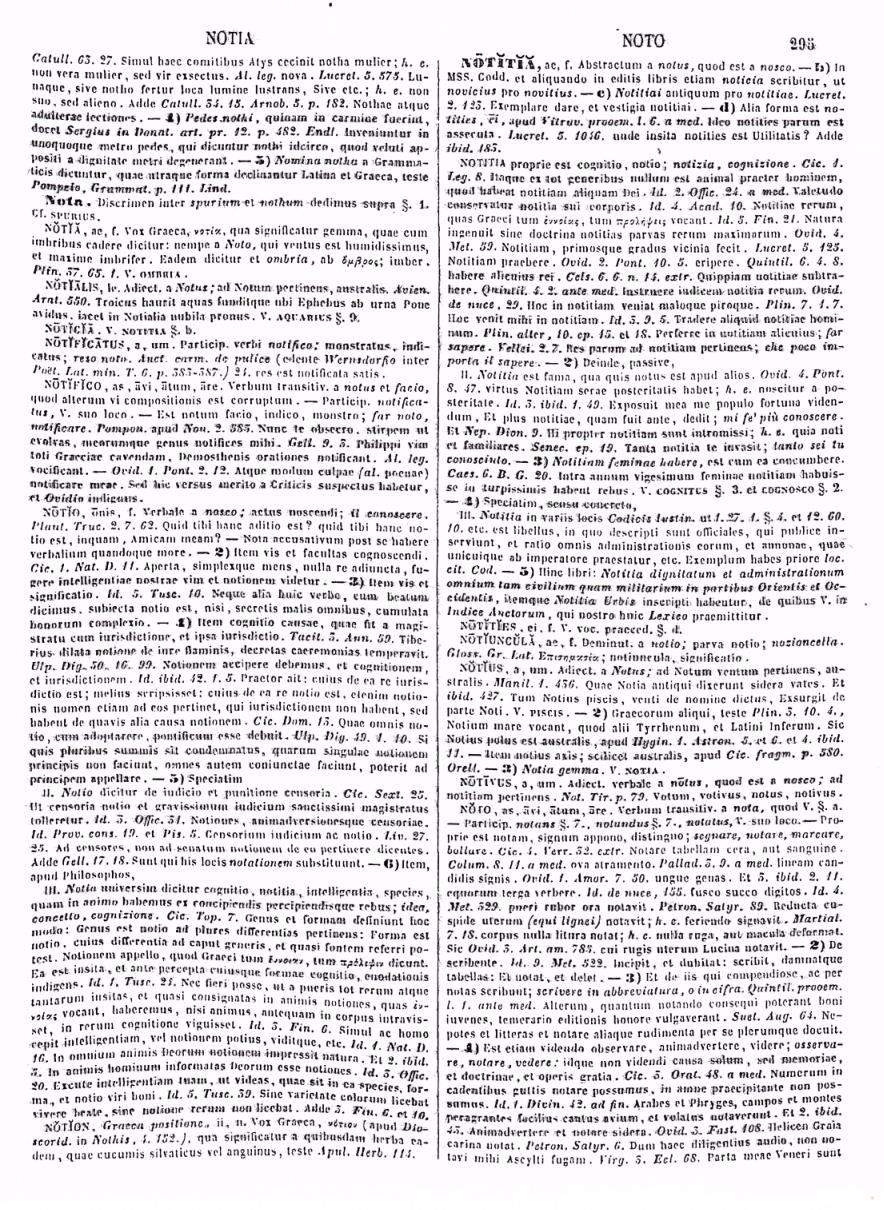 KARL
ERNST GEORGES
Ausführliches Lateinisch-Deutsches Handwörterbuch Basel 1962  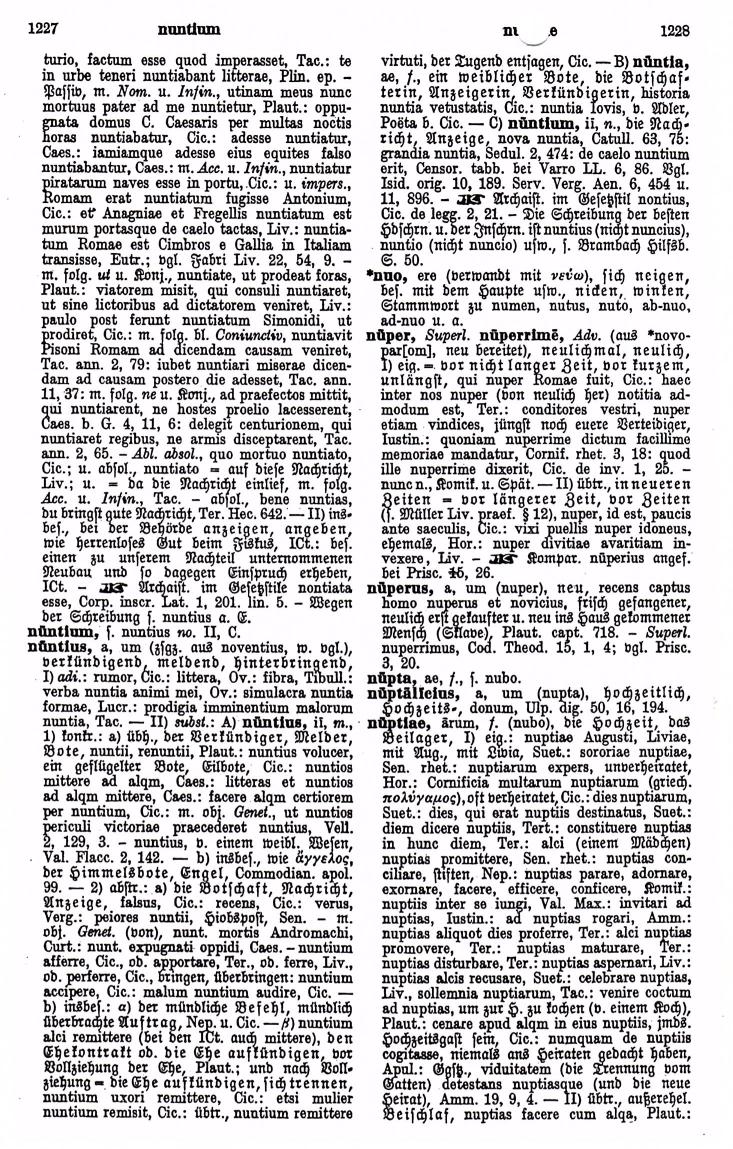 Charlton T. Lewis, Charles Short, A Latin Dictionary Clarendon Press 1879 nuntĭo (nunc- ),
āvi, ātum, 1, v. a.
nuntius, I.to
announce, declare, report, relate, narrate, make known, inform, give
intelligence of, etc.
(cf.: narro, indico, trado,
scribo, dico, certiorem facio, etc.). I. In
gen., alike of verbal and of written communications; constr. acc.
of
thing and dat. of person; for the acc. may
stand an
acc. and inf., a clause with ut or ne and subj.,
or subj. alone, or with de and abl.;
for the
dat. an acc. with ad(ante-class.); in pass.,
both
personal and impersonal, the latter most usually, esp. in perf. nuntiatum
est, with subj.-clause. A. Act. 1. With acc.
of thing (dat. of person): “non dubito quin celerius tibi hoc rumor, quam ullius nostrumlitterae nuntiārint,” Cic. Att. 1, 15, 1: “horas quinque puer nondum tibi nuntiat,” Mart. 8, 67, 1: “senatui ac populo victoriam,” Suet. Ner. 1: “ut nuntiarem nuntium exoptabilem,” Plaut. Stich. 2, 2, 67: “voluptatem magnam,” Ter. Heaut. 1, 2, 10: “quid est, quod percipi possit, si ne sensus quidemvera nuntiant,” Cic. Ac.
2, 25, 79: “talia tibi,” Plin. Ep. 5, 17, 6: “horas,” to
tell the time of day, Mart. 8, 67, 1; 10, 48, 1;
cf. Tac. A. 15, 30.— 2. With
clause: “qui nuntiarent, prope omnes naves afflictas esse,” Caes. B. G. 5, 10; 4, 11, 6: “nuntiateregi vestro, regem Romanum deos facere testes,” Liv. 1, 22, 7: “litterae tuae laeta continebant, quod tein urbe teneri nuntiabant,” Plin.
Ep. 5, 9, 1: “visus est talis, qualem esse eum tuae mihi litteraenuntiārant,” Cic.
Att. 1, 19, 11.—With ut, ne,
or subj.: “Catilinae nuntiare, ne eum Lentulus aliiqueterrerent,” Sall.
C. 48, 4: “deligit centurionem qui nuntiaret regibus ne armis disceptarent,” Tac.
A. 2, 65: “nuntiatum, ut prodiret,” Cic.
de Or. 2, 86, 358: “Vibius nuntiavit Pisoni Romam ad dicendamcausam veniret,” Tac.
A. 2, 79: “jubet nuntiare miserae, dicendam ad causam postero die adesset,” id. ib. 11, 37; Dig.
49, 14, 44.— 3. With inf.:
“ergo nuntiat patri abicere spem et uti necessitate,” Tac.
A. 16, 11 init.— 4. Absol.:
Ly. Salutem multam dicito patrono. Cu. Nuntiabo, I
will do so, Plaut. Curc. 4, 2, 38.— B. Passive constructions. 1. Pers.:
“utinam meus nunc mortuos pater ad me nuntietur,” Plaut. Most. 1, 3, 76: “aquatores preminuntiantur,” Caes. B. C. 1, 73: “crebris motibus terrae ruere in agris nuntiabantur tecta,” Liv. 4, 21, 5: “(tribuni) summā vi restare nuntiabantur,” id.
4, 58, 4; 22,
54, 9: “hoc adeo celeriter fecit, ut simuladesse, et venire nuntiaretur,” Caes.
B. G. 3, 36: “jamjam adesse ejus equites nuntiabantur,” id. ib. 1, 14; Plin.
Ep. 3, 7, 1.— 2. Impers.:
“conantibus, priusquam id effici posset, adesse Romanos nuntiatur,” Caes.
B. G. 6, 4, 1: “Caesari nuntiatur Sulmonenses cupere, etc.,” id.
B. C. 1, 18, 1: “nuntiatur Afranio magnos commeatusad flumen constitisse,” id. ib. 1, 51, 1: “non dubie mihi nuntiabatur Parthos transīsse Euphratem,” Cic.
Fam. 15, 1, 1; Cic. Verr. 2, 5, 34, § 87; id. Mil. 18, 48: “nuntiatum est nobis a M. Varrone, venisseeum Romā,” Cic. Ac.
1, 1, 1: “cum paulo esset de hoc incommodo nuntiatum,” Cic. Verr. 2, 5, 16, § 41: “nuntiatumque Hannibali est,” Liv. 23, 19, 11; Cic. Fam. 11, 12, 1; Tac. A. 2, 79.—Absol.:
“occisoSex. Roscio, qui primus Ameriam nuntiat?” who
will be the first
bearer of the tidings? Cic. Rosc. Am. 34, 96: “bene, ita me di ament, nuntias,” you
bring good news, Ter. Hec. 4, 4, 20.— II. In
partic., in jurid. Lat., to denounce, inform against: “causam pecuniae fisco,” Dig. 49,
14, 39; cf.: “cum heresdecessisset, exstitit qui bona nuntiaret,” ib. 29,
5, 22: opus novum, to inform against a work
undertaken by
another to one's injury: “opus novum, si tibi nuntiavero,” ib. 4, 7,
3; 16; 43,
20, 3. A Latin Dictionary.
Founded on Andrews' edition of
Freund's Latin dictionary. revised, enlarged, and in great part
rewritten by. Charlton
T. Lewis, Ph.D. and. Charles Short, LL.D. nuntĭus , a, um, adj. perh. contr. from noventius, from obsol. novēre, to make new; v. novus. I. That
announces, signifies, makes known; announcing, informing (poet.):
“nuntia fibra deos?” Tib. 2, 1, 26:
“fratre
reversuro, nuntia venit avis,” Mart. 8, 32, 8:
“nuntia littera,” Ov. H. 6, 9: “simulacra In mentes hominum divinaenuntia formae,” Lucr. 6, 77;
cf. id. 4, 704: “habes animi nuntia verba mei,” Ov. H. 16, 10:
“exta venturae nuntiasortis,” Tib. 3, 4, 5.—
II. Usually
as subst.
A. nuntĭum ,
i, n., an announcement, message, news (rare):
“ad aures nova nuntia referens,” this
new message, Cat. 63, 75;
cf.: “nuntius est qui nuntiat, nuntium, quod nuntiatur,” Serv. Verg. A.
11, 896: “de caelonuntium erit,” Varr. L. L. 6, 86:
“tyrannum perturbant nuntia,” Sedul. 2, 474.—
B. nuntĭus ,
i, m., a bearer of news, one who brings
intelligence, a reporter, messenger, courier (freq.
and class.); “both of persons and things: Mercurius Jovis qui nuntius perhibetur,” Plaut. Stich. 2, 1, 1:
“ad me rusadvenit nuntius,” id. Merc. 4, 1, 1:
“o hominem fortunatum, qui ejusmodi nuntios, seu potius Pegasos habet,”Cic. Quint. 25, 80:
litteris, nuntiis, cohortationibus omnes excitare. id. Phil. 14, 7, 20:
facere aliquem certiorem per nuntium, id. Att. 11, 24, 4:
“aliquid audire sine capite, sine auctore, rumore nuntio,” id. Fam. 12, 10, 1:
“litteras et nuntios mittere ad aliquem,” Caes. B. G. 1, 26:
“nuntius ibis Pelidae,” Verg. A. 2, 547:
“nuntius adfert rem,” Cic. Imp. Pomp. 9, 25:
“nuntius ales, i. e. Mercurius,” Ov. H. 16, 68:
“Mercurius, nuntius Jovis et deorum,” Hor. C. 1, 10, 5:
“nuntii afferunt Darium premi a Scythis,” Nep. Milt. 3, 3.—Poet.,
of a woman: “huic dea ... utinam non hic tibi nuntius essem,” Val. Fl. 2, 141.—
b. A
messenger, the bearer of a written message, = tabellarius (very
rare): “nuntio ipsius, qui
litteras attulerat dici (placuit),” Liv. 42, 37, 6.—
2. Abstract.
a. In
gen., a message, news, tidings: “nuntium exoptabilem nuntiare,” Plaut. Stich. 2, 2, 67:
“opta ergo ob istunc nuntium quidvis tibi,” id. Merc. 5, 2, 65:
“inest lepos in nuntio tuo
magnus,” id. Rud. 2, 3, 22:
“acerbum nuntium alicui perferre,” Cic. Balb. 28, 64:
“de Q. Fratre nuntii nobis tristes venerunt,” id. Att. 3, 17, 1:
“exoptatum nuntium alicui afferre,” id. Rosc. Am. 7, 19:
“nuntium optatissimum accipere,” id. Fam. 2, 19, 1:
“nuntium perferre,” id. Lig. 3, 7:
“nuntium ferre ad aliquem,” Liv. 4, 41: “horribilis nuntius affertur,” Cat. 84, 10; Verg. A. 8, 582.—
b. In
partic.
(α). A
command, order, injunction: “quos senatus ad denuntiandum bellum miserat, nisi legatorum nuntioparuisset,” Cic. Fam. 12, 24, 2; Nep. Chabr. 3, 1.—
(β). Nuntium
uxori remittere or mittere, to send one's wife a
letter of divorce, Cic. de Or. 1, 40, 183; 56, 238; id. Att. 1, 13, 3; Dig. 24, 2, 4; 24, 3, 22.—Also
of a woman who separates from her husband, Cic. Top. 4, 19; App. M. 9, p. 230 med. —Of
the annulling of a betrothment: “si invito patrono nuntium sponsa liberta remiserit,” Dig. 23, 2, 45.—Of
the rejection of the marriage contract by the parents and guardians: “ego adeo jam illi remittam nuntium adfinimeo,” Plaut. Truc. 4, 3, 74:
“si puellae tutores ad infringenda sponsalia nuntium miserint,” Dig. 23, 1, 6.—
C. nuntĭa ,
ae, f., a female messenger, she that brings tidings:
nuntia fulva Jovis, i. e. the eagle,
Poët. ap. Cic. Leg. 1, 1, 2;
cf. Liv. 1, 34: “historia nuntia vetustatis,” Cic. de Or. 2, 9, 36:
“vox nuntia cladis,” Liv. 5, 50: “fama nuntia veri,” Verg. A. 4, 188; Ov. P. 4, 4, 15:
“plaga nuntia rerum,” Lucr. 4, 704;
cf. Val. Fl. 2, 141;
B. 1. a. fin. supra.
|
|
|
|
| Homepage | Research | Activities |
| Publications | Teaching | Interviews |